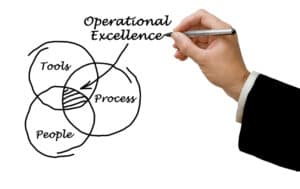
Achieving operational excellence through data-driven strategies demands more than just technological upgrades; it necessitates a comprehensive approach encompassing organizational readiness, cultural transformation, and proactive change management.
In today’s dynamic business landscape, operational excellence is not just a goal; it is a necessity for thriving in a competitive environment. Organizations are increasingly moving beyond reliance on intuition or historical trends by leveraging data-driven insights. This strategic shift ushers in the era of smart business powered by advanced analytics and machine learning algorithms. Consequently, it drives a complete evolution towards agility and innovation in modern business operations, empowering organizations to adapt swiftly to market changes, capitalize on emerging opportunities, and face challenges with resilience.
Industries like manufacturing exemplify operational excellence with advancements in supply chain efficiency through predictive maintenance (e.g., sensor-based data analysis to predict equipment failure), reducing downtime, avoiding costly repairs, and gaining a competitive edge. Within this transformative landscape, cost savings and containment efforts play a crucial role. By harnessing data-driven tools such as real-time analytics platforms, organizations can systematically streamline processes, identifying opportunities for significant cost reduction.
In healthcare, data-driven insights are revolutionizing patient care management and reshaping the entire healthcare landscape. Electronic health records (EHRs) and wearable health devices provide real-time patient health data, enabling proactive interventions and personalized treatment plans. Predictive analytics identify disease patterns, enabling early interventions and cost savings. AI-powered diagnostic tools enhance medical imaging and diagnostics accuracy. Data-sharing platforms foster collaboration and accelerate medical discoveries. Overall, data-driven approaches empower healthcare providers to deliver more personalized, proactive, and cost-effective care, driving operational excellence in healthcare.
Moreover, in the pursuit of operational excellence, edge computing plays a pivotal role. Edge computing involves processing data closer to where it is generated, such as on devices or sensors, rather than relying solely on centralized servers. This approach reduces latency and bandwidth usage, making it ideal for industries such as manufacturing, healthcare, and retail. For example, in manufacturing, edge computing facilitates predictive maintenance by analyzing equipment sensor data in real time, allowing for immediate detection of potential issues and preventing costly downtime. Similarly, in healthcare, edge computing supports remote patient monitoring by processing data from wearable health devices onsite, enabling healthcare providers to intervene quickly in case of emergencies or abnormalities. In retail, edge computing enhances the efficiency of inventory management and personalized marketing efforts by analyzing customer data directly within stores, leading to more targeted promotions and improved customer experiences.
See also: Calling the Shots: Navigating Business Destiny with Data-Driven Strategies
Achieving operational excellence
The journey towards operational excellence requires effective adoption and change management strategies beyond technological integration. Transitioning to a data-driven culture involves organizational transformation and employee buy-in, which necessitates leadership commitment and comprehensive training programs. Fostering a collaborative environment is crucial for successful adoption, supported by change management efforts addressing potential challenges. Clear communication and recognition of early wins reinforce the benefits of data-driven practices.
The realm of customer service also benefits from scalable and sustainable data-driven insights. These insights, generated by tools like conversational AI chatbots and emotion recognition software, revolutionize the customer experience by anticipating needs, proactively resolving issues, and tailoring offerings to individual preferences. For instance, the retail industry can leverage data to offer personalized product recommendations based on past purchases and real-time browsing behavior, enhancing customer satisfaction and loyalty while creating a continuous feedback loop for further improvement.
In the dynamic landscape of data-driven operational excellence, data governance emerges as the silent guardian. It ensures not only efficiency but also secure, ethical, and compliant data management. Going beyond a mere checklist, governance maintains trust with customers by upholding data integrity and ethical decision-making. It guarantees responsible and ethical data usage, respecting privacy and rights. Failure to prioritize responsible data usage can result in legal repercussions and severe reputational damage, affecting customer loyalty and brand perception.
According to McKinsey Global Institute, data-driven organizations are 23 times more likely to acquire customers, six times as likely to retain customers, and 19 times more likely to be profitable. Thus, highlighting the tangible benefits of embracing data-driven strategies. Additionally, the rapid advancement of artificial intelligence and machine learning technologies further amplifies the potential for leveraging data insights to drive business success. By harnessing these innovative tools, organizations can gain deeper insights into consumer behavior, optimize operations, and innovate more effectively. Such advancements underscore the importance of continuously evolving data-driven approaches to stay competitive in today’s fast-paced business landscape.
In summary, achieving operational excellence through data-driven strategies demands more than just technological upgrades; it necessitates a comprehensive approach encompassing organizational readiness, cultural transformation, and proactive change management. Leaders should prioritize robust training programs and foster a collaborative environment to empower employees with the skills and resources needed to leverage data effectively. Furthermore, seeking proven professional support can provide invaluable guidance throughout this journey, ensuring that organizations navigate challenges successfully and capitalize on opportunities for innovation. Ultimately, by integrating these strategies and upholding stringent data governance principles, organizations can establish a solid foundation for sustainable success in today’s data-driven landscape.





























